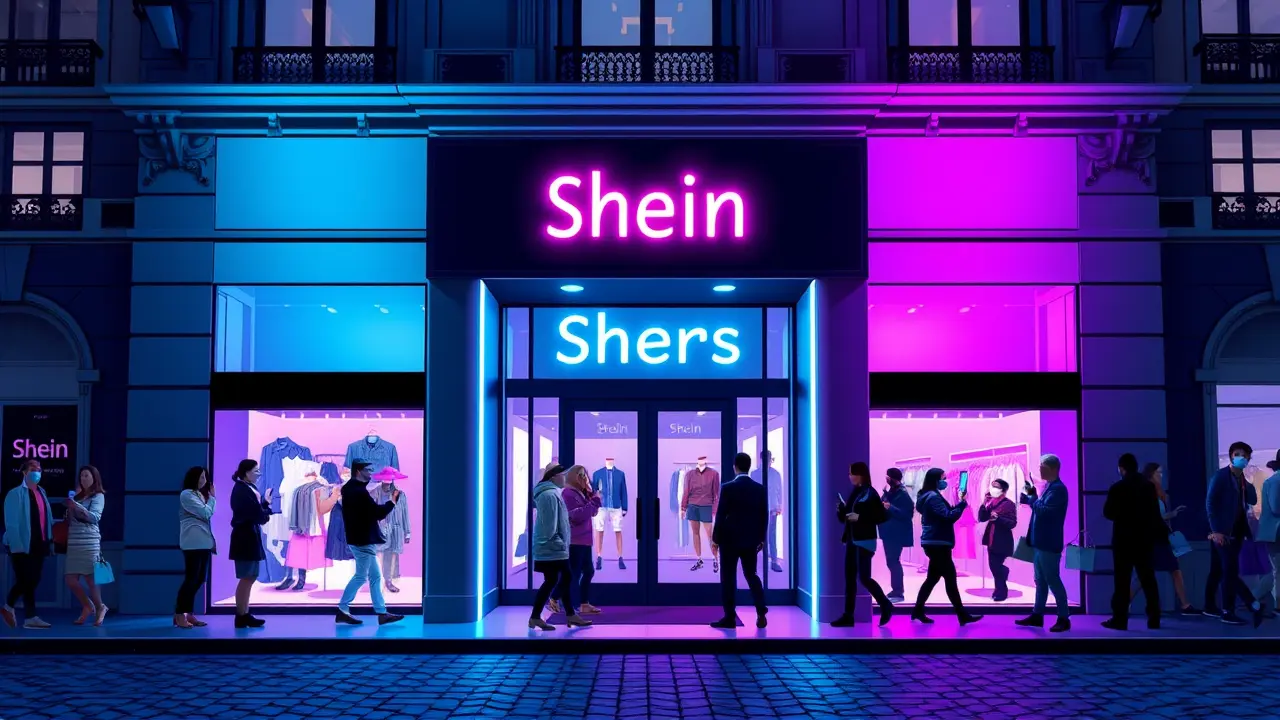
Politicsprotests & movementsMass Demonstrations
Shein opens first permanent Paris store amid protests.
EM
Emma Wilson
5 hours ago7 min read1 comments
The grand boulevards of Paris, a city synonymous with timeless elegance and the very cradle of haute couture, became the stage for a starkly modern confrontation today as the Chinese fast-fashion behemoth Shein opened its first permanent European store. The scene on the Rue de Rivoli was a study in jarring contrasts: a snaking queue of eager shoppers, smartphones in hand, pulsed outside the newly unveiled boutique, their excitement palpable as they awaited entry into a promised land of hyper-affordable trends.Just meters away, a separate, equally determined crowd of protesters brandished signs condemning the environmental and ethical cost of disposable fashion, their chants of 'Shein, dégage!'—'Shein, get out!'—echoing off the historic limestone facades. This is not merely the launch of another retail outlet; it is a physical manifestation of a global cultural war over consumption, capitalism, and conscience, playing out in real-time under the gaze of a French government increasingly scrutinizing the practices of ultra-fast-fashion giants.The tension was thick enough to cut with a pair of fabric shears, a direct challenge to the city's identity. For decades, Paris has been the hallowed ground of Chanel, Dior, and Saint Laurent, where fashion is treated as an art form, with garments painstakingly crafted over months.Shein’s model represents the antithesis: a digitally-native, algorithm-driven machine that can conceive, produce, and deliver thousands of new styles weekly, often for less than the price of a café au lait. This operational velocity, powered by a sophisticated on-demand manufacturing system and a vast, opaque network of suppliers in China, is precisely what has propelled Shein to a staggering valuation and made it a Gen Z favorite, but it is also the source of its profound controversies.Protesters, a coalition of environmental activists like Les Amis de la Terre and garment union representatives, articulated a litany of grievances. They decry the colossal environmental footprint, citing the industry-wide statistic that fashion accounts for up to 10% of global carbon emissions, with Shein's relentless output and reliance on synthetic, petroleum-based fabrics like polyester being a significant contributor.They point to mountains of textile waste in landfills, both in the Global South where unsold clothes often end up and in local communities, fueled by a 'wear-once' culture the company is accused of promoting. And they raise alarming questions about labor practices within its supply chain, with past reports alleging excessive working hours and poor conditions, claims that Shein says it is addressing through new audits and investments.This public backlash is no longer just street theater; it is crystallizing into political action. The French government, led by President Emmanuel Macron, has been actively promoting a 'sovereign Europe' and is currently shepherding ambitious legislation aimed at curbing the excesses of fast fashion.A landmark bill, passed unanimously by the lower house of parliament just weeks ago, specifically targets the industry with proposed penalties, including a potential ban on advertising for the cheapest textiles and an environmental levy tied to the volume of items produced. The arrival of Shein's flagship store, therefore, feels like a deliberate provocation, a corporate gauntlet thrown down in the heart of the very nation seeking to regulate it out of existence.It raises a critical strategic question: Is this a bold move to normalize its brand presence and win over European consumers with a tactile, physical experience, or a profound miscalculation that will galvanize its opponents and provide a potent visual symbol for lawmakers? Inside, the store itself is designed to blur the lines between digital and physical, with QR codes for scanning items to purchase online and a sleek, minimalist aesthetic that belies the chaotic, resource-intensive system behind its inventory. For the shoppers waiting in line, many of them young students and budget-conscious families, these macro-level debates often feel abstract compared to the immediate gratification of accessible style.They speak of Shein’s appeal in terms of choice, individuality, and the simple economics of being able to participate in fashion trends without financial strain, a powerful argument in a time of persistent cost-of-living pressures across Europe. Yet, the company's future in France and the EU is fraught with uncertainty beyond the protests.It faces intense scrutiny from European Union competition regulators over its supply chain links and its potential circumvention of import duties via the 'de minimis' rule, which allows small-value packages to enter with less oversight. The outcome of these investigations could fundamentally alter its business model.The opening on the Rue de Rivoli is more than a retail event; it is a watershed moment. It forces a public reckoning with the true cost of our clothing, pitting the democratizing force of affordable fashion against the urgent imperatives of planetary health and social equity. As the last protester dispersed and the final customer left with their brightly colored shopping bag, the question hanging over Paris was not just about Shein's survival, but about what kind of future—and what kind of fashion—Europe truly wants to wear.
#featured
#Shein
#fast fashion
#protests
#Paris
#retail
#government scrutiny
#public backlash
Stay Informed. Act Smarter.
Get weekly highlights, major headlines, and expert insights — then put your knowledge to work in our live prediction markets.
© 2025 Outpoll Service LTD. All rights reserved.